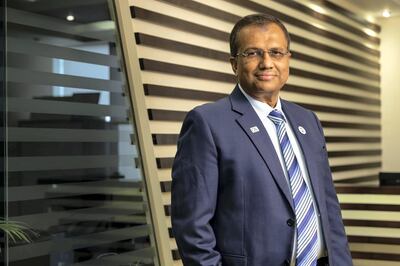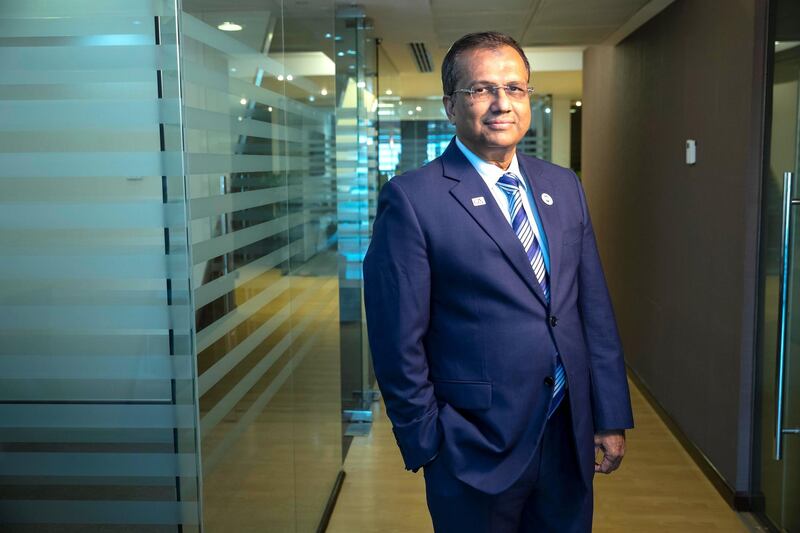Mahmood Bangara is chairman of the Dubai chapter of The Institute of Chartered Accountants of India (ICAI), the world’s second largest accounting body, with more than 250,000 members. Established 35 years ago, Dubai boasts the largest overseas chapter, with a 2,500-plus membership. A chartered accountant by profession and Dubai resident for 33 years, Mr Bangara is also chairman of digital and cellular technology company AMT Group and lives in The Villa with his wife, three grown up sons and two school-age daughters. He shares his money outlook.
How did your upbringing shape your attitude towards money?
I am from an ancestral family in Kerala. My mother was a housewife, my father had a small business, trading household items, and was into politics. He became a member of Kerala State Legislative Council. Generally, we see politicians become prosperous, but it was the other way around, because of his commitment.
I have two brothers and two sisters; I’m in the middle. It was an above average house. We had an education; there was nothing to complain about. I learned financial discipline as a child. As a student my necessities were met. I used to help in my father’s store. My father was very well respected in the community. This was the biggest inspiration.
What were you paid in your first job?
When I started in chartered accountancy I had to work for three years, an apprenticeship, under a practicing chartered accountant paid 150 Indian rupees (Dh8) a month. My first professional job was with the same organisation, earning 3,000 rupees.
Are you a spender or a saver?
Both. I’m not an extravagant person. Whatever we need to spend on as a family, I enjoy doing that - holidays, once in a while a good restaurant. I’m not a fan of bank borrowing. I’ve never borrowed, even for my house, my car. I save and invest and what I have achieved is out of the profits generated.
How do you save?
Multiple ways, I have properties in Dubai, in India. I have stocks; have invested in funds. It is diversified. Some properties I invested in would fetch a good value. Some stocks in private companies - private investments - also fetch a return.
________
Read more:
Money & Me: 'Achieving financial independence has been my biggest milestone'
Allsopp & Allsopp founder: 'I went from being sacked in the UK to driving a Rolls-Royce in Dubai'
Money & Me: 'I've made every money mistake you can in 13 years in the UAE'
Money & Me: 'I wish I had invested more in cryptocurrencies two years ago'
________
What brought you to Dubai?
I came here in 1994 and got a job with Maritime Industrial Services (MIS), as an accountant. I was 27. We were into oilfield engineering, construction and fabrication, in the energy sector; a small company with 300 employees. It grew phenomenally to 8,000 employees, and gave me the opportunity to grow my position, exposure, knowledge and experience in all fields of corporate management. After 25 years the company was 100 per acquired by our competitor. At the time I was vice president of group finance; I stepped down.
Why become an entrepreneur?
My passion was my profession. When I moved along in the profession, I got opportunities. That led me to think I should be developing myself as a businessman. Chartered accountants are considered experts in finance; any entrepreneur will take advice from his finance managers. I felt the advisors are sitting not in the engine room, but just behind the engine. Accountants have the ability and knowledge to sense risk. There is natural inertia not to get into entrepreneurship - every action will have a risk - whereas an entrepreneur will want to capitalise an opportunity. This mental situation is something you need to manage.
Twenty years ago, mobile phone technology was emerging. When MIS was fully sold I didn’t want to take another job. I was a passive investor here (AMT). Once MIS finished I was able to come full time. We repositioned the company. I injected capital. This company grew phenomenally well.
Has the accounting profession changed here?
Finance is the blood circulation for an organisation. Accounting is an integral part. So long as there is finance, accountants are associated with that. It is a strong profession, but there is a lot of transformation happening. Standard routines…the trend is getting more automated. That leaves time and space for accountants to get into a higher level in an organisation – they’re emerging as business leaders. Their roles are more dominant and managerial, strategic positions.
Do you have a philosophy towards money?
The man who doesn’t have any debt is a rich person. If you have so much property and business and so much debt, your net is negative, even though you will be seen otherwise. You should be able to take care of yourself, have a decent living, accommodation, be able to take care of your children and shouldn’t be worrying about debts. That is the level one to look for.

What is your most cherished investment?
This business. I put a minimal amount of money in. The magnitude it grew to…it was a very wise investment. It was a fulfilment of an aspiration to become an entrepreneur.
Is there anything you regret spending money on?
There is an inherent risk in any opportunity. There are some things I invested in - properties and trading deals - that achieved lower than expected (yields) or resulted in loss. But many other opportunities performed better than I thought. It can’t go one way for all. Endurance in accepting a loss is a prerequisite for someone to become an entrepreneur. Failure should be accepted. It’s not the failed decision that is really bad but bothering about it; if you can’t reverse that decision you have to move on.
Do you prefer paying in cash or credit card?
Nowadays it is more convenient to pay with the card. I pay it off. Don’t spend the money before you earn it. Control your first bill and pay every month.
Do you plan for the future?
I have fulfilled a lot of aspirations. God has been kind enough. I feel sometimes there is no retirement; I should keep going. If I could be of value to my family, my children … I wish that they are all successful, enjoy their lives.
If you won Dh1 million, what would you spend it on?
There’s an obligation to reach out, to help people who you can within your boundaries and limits. There would definitely be one portion for charity objectives.






